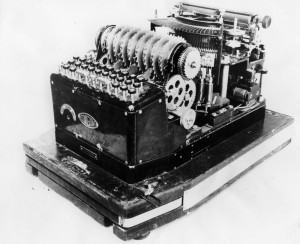Posted by Beachcombing
Regular readers of this blog will know that Beach is extremely suspicious of conspiracy theories and those who write about them. However, one partial exception is Robin Ramsay, joint founder of Lobster Magazine, a Fortean Times columnist and a general conspiracy guru. RR certainly has a thorough understanding of conspiracy theorists: ‘[w]hat is wrong with most conspiracy theorists is not what they think but the way they think’. And he begins his own musing on conspiracies – musings that are above all political – with the sad fact that democratic states have often lied to their own citizens. Whether you put on your night vision goggles and follow him into the conspiracy bunker is another question: but there is no getting away from that basic truth.
Beachcombing recently came across the following assertion in RR’s writing that outraged Beach’s historical instincts, but that also got his curiosity racing. A common point of those who mock conspiracy theorists is that the ambitious world-wide conspiracies posited need tens if not hundreds of people to carry them out. Therefore, it goes without saying that it would have been impossible to, say, fake the moonlandings or shoot Kennedy because one of the sixty or seventy people in the know would, sooner or later, have squealed. Beachcombing with his poor estimation of human nature would certainly go along with this. But RR has his doubts: one of the pleasant things, indeed, about reading RR is that he never takes anything on trust. And here RR makes a fascinating comparison with Bletchley Park.
Bletchley Park in Bucks was the centre of an immense effort on the part of the British to break German codes in World War Two. Men like Alan Turing worked there, often to exhaustion, to provide Ultra, the precious decrypts of German military and security messages sent by Enigma and other coded machines. RR gives this as an example that demonstrates that the lid can be kept on big secrets: ‘Most obvious is the Ultra secret, the British breaking of the German Enigma machine, an enormous secret, which was kept by hundreds and perhaps thousands of people between 1941 and J.C. Masterman’s book which revealed it in 1972 [Double Cross System].’
So does the comparison stand up?
The lack of German penetration, given the poor German efforts at intelligence collection in the UK in the war, is perhaps not a surprise. The only time, indeed, when the Germans smelt a rat was when the Allies took too obvious advantage of the information that they gathered. Churchill, it will be remembered, called the Bletchley cryptographers ‘the geese who laid the golden eggs but never cackled’.
However, it is remarkable that the Soviet Union never got any wind of the British and later American achievement at breaking Enigma. It has even been suggested that the Lucy spy-ring in Switzerland was, at base, a British rouse to get Enigma decrypts to the Politburo in such a way that the information received would be trusted.
It is also extraordinary that no information leaked out from 1945 and the end of hostilities till the late 1960s when the first hints at allied code-breaking began to appear in books.
The motive for continued security was, incidentally, a simple one: many states, particularly in the third world, continued to use Enigma into the 1970s and this suited the Allies purposes admirably!















No comments:
Post a Comment